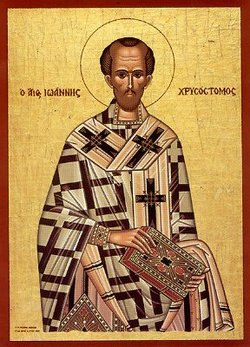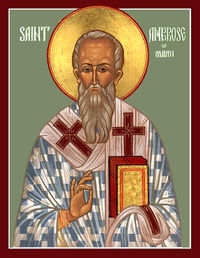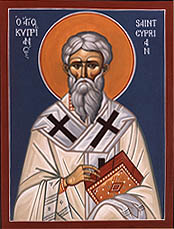Note of our blog: Some of these texts were collected from some our brothers Roman Catholics or Protestants. We please them to know the Orthodox Church (Ancient Church), by texts like:
Basic Points of Difference between the Orthodox Church and Catholic Church
The Way - An introduction to the Orthodox Faith
Theosis (deification): The True Purpose of Human Life
The significance of the “Antilytron”
Protestants ask: Why be Orthodox?
We thank them.
Early Church Father's and Outside Witness to Christians, poor, stranger and wealth!
Photo from here
Here are some awesome quotes about how the early church (90 ad - 500 ad)
viewed and was viewed in regards to wealth and related topics. I tried
to personally research these so you can be sure that they are legit.
Also, I put links to biographies and original works. Hope this blesses
you!
“Share everything with your brother. Do not say, ‘It is private property.’ If you share what is everlasting, you should be that much more willing to share things which do not last.”
“Share everything with your brother. Do not say, ‘It is private property.’ If you share what is everlasting, you should be that much more willing to share things which do not last.”
- The Didache, c. 90 AD, (Did. 4:8)
Christians "...they love one another, and from widows they do not turn away their esteem; and they deliver the orphan from him who treats him harshly. And he, who has, gives to him who has not, without boasting. And when they see a stranger, they take him in to their homes and rejoice over him as a very brother; for they do not call them brethren after the flesh, but brethren after the spirit and in God.”
Christians "...they love one another, and from widows they do not turn away their esteem; and they deliver the orphan from him who treats him harshly. And he, who has, gives to him who has not, without boasting. And when they see a stranger, they take him in to their homes and rejoice over him as a very brother; for they do not call them brethren after the flesh, but brethren after the spirit and in God.”
– Aristides, early 2nd century (Apology 15)

St. Aristides the Athenian
“We who once took most pleasure in the means of increasing our wealth and property now bring what we have into a common fund and share with everyone in need.”

St. Aristides the Athenian
“We who once took most pleasure in the means of increasing our wealth and property now bring what we have into a common fund and share with everyone in need.”
– Justin the Philosopher & Martyr, 100-165 AD (1st Apology 14)
“Christians despise all possessions and share them mutually.”
“Christians despise all possessions and share them mutually.”
– Lucian (pagan author), 2nd century (Peregrinus 13) (Couldn't personally verify)
“And instead of the tithes which the law commanded, the Lord said to divide everything we have with the poor. And he said to love not only our neighbors but also our enemies, and to be givers and sharers not only with the good but also to be liberal givers toward those who take away our possessions.”
“And instead of the tithes which the law commanded, the Lord said to divide everything we have with the poor. And he said to love not only our neighbors but also our enemies, and to be givers and sharers not only with the good but also to be liberal givers toward those who take away our possessions.”
– Irenaeus, 130-200 AD (Against Heresies, Book IV, Chapter XIII, paragraph 3)
Disciple of Polycarp who was a disciple of the Gospel writer and Apostle John.
Disciple of Polycarp who was a disciple of the Gospel writer and Apostle John.
“Private property is the fruit of iniquity. I know that God has given us
the use of goods, but only as far as is necessary; and he has
determined that the use shall be common. The use of all things that are
found in this world ought to be common to all men. Only the most
manifest iniquity makes one say to another, ‘This belongs to me, that to you.’ Hence the origin of contention among men.”
– Clement of Alexandria, 150-215 AD
Mentor of Origen
Mentor of Origen
The quote is from the Instructor (or called Paedagogus), bk II, ch. 13. It goes on to say, "It is monstrous for men to live in luxury while many are in need."
“We who share one mind and soul obviously have no misgivings about community in property.”
– Tertullian, 160-225 A.D.
(Apology 39)

“It is absurd and disgraceful for one to live magnificently and luxuriously when so many are hungry…If one who takes the clothing off another is a thief, why give any other name to one who can clothe the naked and refuses to do so? The bread that you store up belongs to the hungry; the cloak that lies in your chest belongs to the naked; the gold that you have hidden in the ground belongs to the poor …How can I make you realize the misery of the poor? How can I make you understand that your wealth comes from their weeping?”
(Apology 39)

“It is absurd and disgraceful for one to live magnificently and luxuriously when so many are hungry…If one who takes the clothing off another is a thief, why give any other name to one who can clothe the naked and refuses to do so? The bread that you store up belongs to the hungry; the cloak that lies in your chest belongs to the naked; the gold that you have hidden in the ground belongs to the poor …How can I make you realize the misery of the poor? How can I make you understand that your wealth comes from their weeping?”
- Basil the Great, 320-379 AD
He used all his personal wealth and the income from his church for the benefit of the destitute; in every center of his diocese he built a poor-house; and at Caesarea, a home for wanderers and the homeless (from here).
“The rich are in possession of the goods of the poor, even if they have acquired them honestly or inherited them legally.” “Not to enable the poor to share in our goods is to steal from them and deprive them of life. The goods we possess are not ours but theirs.” “When you are weary of praying and do not receive, consider how often you have heard a poor man calling, and have not listened to him.”

He used all his personal wealth and the income from his church for the benefit of the destitute; in every center of his diocese he built a poor-house; and at Caesarea, a home for wanderers and the homeless (from here).
“The rich are in possession of the goods of the poor, even if they have acquired them honestly or inherited them legally.” “Not to enable the poor to share in our goods is to steal from them and deprive them of life. The goods we possess are not ours but theirs.” “When you are weary of praying and do not receive, consider how often you have heard a poor man calling, and have not listened to him.”

- John Chrysostom, 347-407 AD
“Give away these earthly things, and win that which is in heaven. Give that which you must leave, even against your will, that you may not lose things later. Lend your wealth to God, that you may be really rich. Concerning the way in which to lend it, Jesus next teaches us saying: ‘Sell your possessions, and give alms, provide yourselves with purses that do not grow old, with a treasure in the heavens that does not fail’ … Worldly wealth has many foes … but no one can do damage to the wealth that is laid up above in heaven.”
"For Christians above all men are forbidden to correct the stumblings of sinners by force...it is necessary to make a man better not by force but by persuasion. We neither have autority granted us by law to restrain sinners, nor, if it were, should we know how to use it, since God gives the crown to those who are kept from evil, not by force, but by choice."
St. John Chrysostom (from here)
“Give away these earthly things, and win that which is in heaven. Give that which you must leave, even against your will, that you may not lose things later. Lend your wealth to God, that you may be really rich. Concerning the way in which to lend it, Jesus next teaches us saying: ‘Sell your possessions, and give alms, provide yourselves with purses that do not grow old, with a treasure in the heavens that does not fail’ … Worldly wealth has many foes … but no one can do damage to the wealth that is laid up above in heaven.”
- Cyril of Alexandria, 378-444 AD, (Commentary on Luke, Homily 91)
Thanks to Rachel Stanton her work!
Blessings and Peace!
Some also from Patheos
You are not making a gift of your possession to the poor person. You are handing over to him what is his.
Ambrose of Milan, 340-397.

 The
property of the wealthy holds them in chains . . . which shackle their
courage and choke their faith and hamper their judgment and throttle
their souls. They think of themselves as owners, whereas it is they
rather who are owned: enslaved as they are to their own property, they
are not the masters of their money but its slaves.
The
property of the wealthy holds them in chains . . . which shackle their
courage and choke their faith and hamper their judgment and throttle
their souls. They think of themselves as owners, whereas it is they
rather who are owned: enslaved as they are to their own property, they
are not the masters of their money but its slaves.Cyprian of Carthage, 300 A.D.
Let the strong take care of the weak; let the weak respect the strong. Let the rich man minister to the poor man; let the poor man give thanks to God that he gave him one through whom his need might be satisfied.
Clement of Rome, 1st Century
The Philanthropy of Holy Martyr Philothei the Athenian (Feast Day - February 19)

Mystagogy
Saint Philothei was born in Athens in 1522 to an illustrious family. Against her will, she was married to a man who proved to be most cruel. When he died three years later, the Saint took up the monastic life and established a convent, in which she became a true mother to her disciples. Many women enslaved and abused by the Muslim Turks also ran to her for refuge. Because of this, the Turkish rulers became enraged and came to her convent, dragged her by force out of the church, and beat her cruelly. After a few days, she reposed, giving thanks to God for all things. This came to pass in the year 1589. She was renowned for her almsgiving, and with Saints Hierotheus and Dionysius the Areopagite is considered a patron of the city of Athens.
From a Greek biography of the Saint:
Certainly philanthropy was one of Saint Philothei's main motives. At a time when there were no hospitals, no shelters for the poor, no homes for the elderly, no asylums, and no shelters for the protection of women, their place was taken by monastic institutions.
In addition to her dedication to a virtuous life, practicing philanthropy by offering protection, giving alms and ministering to the poor and sick, providing Christian education by teaching everyone ecclesiastical letters and liturgical knowledge, the holy woman contributed the following:
First, she founded schools for the children of the Athenians, to open their eyes to the tradition and renown of their ancestors. 'Lay hold of instruction, lest at any time the Lord be angry' (Ps. 2:12). Philothei brought this scriptural quotation to reality. Within her flickered the hope of the rebirth of the Byzantine Empire and... the early deliverance from the bestial yoke of the conquerors.
Second, Philothei aimed at protecting the daughters of Athens from the disgrace of conversion to Islam... The danger of being subjected to conversion existed not only for the noble daughters who were forcibly abducted by the Turks because of their beauty and grace, but also for the simple ones, the peasant girls, who were forced to work in Turkish homes and farms in order to sustain themselves. Pressure, necessity and ignorance (the great deceiver) were causes in forcing the maidens into submission.
However, Philothei, with her convent of virgins (Παρθενώνα), her schools, her convent's metochia, and family ties, was capable of either strengthening those under duress or sending them away and hiding them. This was done until their consciences recovered or the danger subsided; and until fear was replaced by a spirit of faith and sacrifice for the sake of the Christian Faith.
N.B. Tomadakis, The Life and Service of Saint Philothei, University of Athens.
Please also
Is capitalism compatible with Orthodox Christianity?
Capitalism, Protestant Ethics & Orthodox Tradition
Fathers of Church & Capitalism : Interest, Usury, Capitalism

Δεν υπάρχουν σχόλια:
Δημοσίευση σχολίου